Oman's military chief meets Iran's top general in Tehran
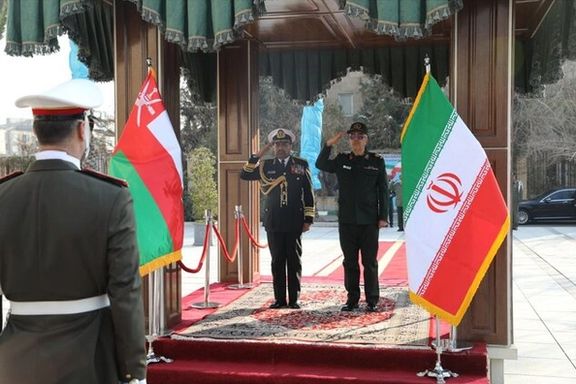
Omani and Iranian military chiefs met in Tehran on Tuesday as the two nations prepare for military drills.

Omani and Iranian military chiefs met in Tehran on Tuesday as the two nations prepare for military drills.
Oman's chief of staff, Abdullah bin Khamis Al Raisi, arrived in Tehran on Monday at the invitation of his Iranian counterpart, Mohammad Bagheri.
Iranian state media said during the visit, Al Raisi is expected to tour an exhibition of Iran's military capabilities and meet with senior Iranian military commanders.
Last week, Iran's IRGC navy chief announced there will be ongoing drills with other countries neighboring Iran such as Oman.
"We have had engagements with Oman's navy in this regard and have participated in joint drills with Oman," he said.
Oman has been a key ally to Tehran, one of the players helping to mediate a rapprochement with Saudi Arabia which resumed diplomatic ties with Iran in 2023 after a seven year blackout.
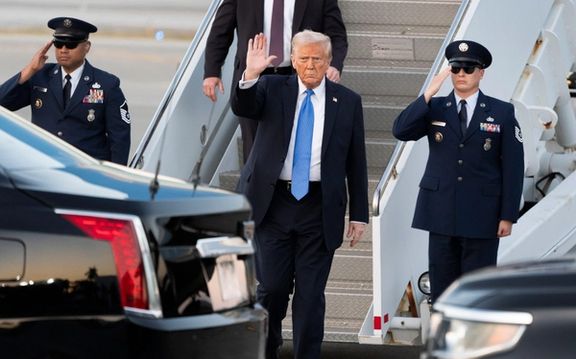
Iran is terrified after losing almost all its air defenses and now would love to make a deal with the United States, Donald Trump said on Monday, adding that he would also prefer a deal with Tehran to an Israeli attack on their nuclear sites.
"Iran is very concerned. Iran is very frightened, to be honest with you, because their defense is pretty much gone," Trump told Fox News.
He was apparently referring to Israel's October attacks on Iran which, according to US officials, knocked out the country's last three Russian-provided S-300 air defense missile systems.
"Maybe they are trying to get new defense as we speak but their defense is largely gone... Iran is very nervous. I think they're scared. I think Iran would love to make a deal and I would love to make a deal with them without bombing them," Trump added.
Israeli officials have repeatedly raised the possibility of military action against Iran’s nuclear program, but Trump has insisted that he hopes a deal over Iran's nuclear program would make it so that the United States did not have to support an Israeli attack on Iran.
"Everybody thinks Israel with our help or our approval will go in and bomb the hell out of them," Trump said Monday, stressing that Israel would need the US support for such a strike.
"I would prefer that not happen. I'd much rather see a deal with Iran where we can do a deal, supervise, check it, inspect it."
Earlier he had said that any reports the United States and Israel would work together on a devastating military attack on Iran were overblown.
"I want Iran to be a great and successful Country, but one that cannot have a Nuclear Weapon. Reports that the United States, working in conjunction with Israel, is going to blow Iran into smithereens,” ARE GREATLY EXAGGERATED," Trump said on February 5.
'Iran is very militant'
Trump has long opposed foreign wars but has adopted a hard line on Iran, beefing up sanctions on its oil exports in his first term and pulling out of an international deal on Tehran's disputed nuclear program, known as the Joint Comprehensive Plan of Action (JCPOA).
"That was the dumbest" deal, Trump said. "And by the way, that would have expired by now. That was a road to a nuclear weapon. It was a short-term deal. You can't make a deal with just a few years on it."
Trump was referring to the so-called sunset clauses of the 2015 nuclear deal which, according to him, would enable Iran to pursue nuclear weapons in the future.
"They would have a legal right to have a nuclear weapon. You cannot allow Iran or just about anybody else by the way but especially Iran because they are very, very militant. You can't allow them to have a nuclear weapon," he told Fox News.
Trump said there are two ways to stop Tehran from developing a nuclear weapon: "With bombs or with a written piece of paper. And I'd much rather do a deal that's not going to hurt them. And I think they want it too."
Iran has denied seeking a nuclear weapon, but Israel has long contended that a bomb in the hands of its arch-enemy poses an existential threat.
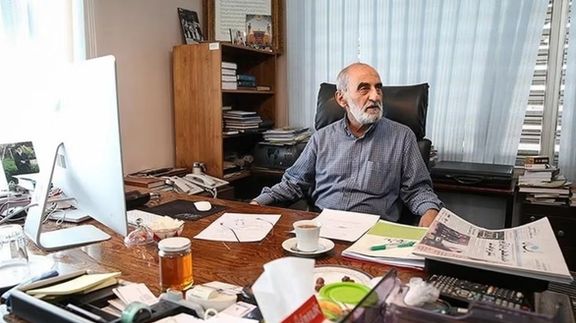
The hardline Kayhan newspaper which is overseen by Iran's Supreme Leader has yet to comply with a court ruling requiring the return of a sizable tract of public land, according to a whistleblower journalist.
The land dispute involving a body at the heart of Iranian establishment illuminates the controversy around alleged land grabs involving well-connected people and institutions.
Centering on 200 hectares in Damavand near Tehran, the case dates back to 1996, three years after longtime editor Hossein Shariatmadari was appointed as Ali Khamenei’s representative at the Kayhan Institute overseeing the newspaper.
According to the journalist Yashar Soltani, at the time, the government transferred the land for tree farming and grazing. However, subsequent legal changes challenged such allocations.
“On November 25, 1996, Gholamreza Forouzesh, the minister of agriculture, approved the allocation of 200 hectares of land to the Kayhan Institute. The land was intended for the construction of a township to consolidate all of the institute's publications, as well as for a printing house and administrative facilities.
"However, it was later transferred to the institute under the vague and general pretexts of livestock farming,” said a report by Soltani.
A law passed in 2003 mandated that land transfers made after 1985 without provincial commission approvals must be reversed if the intended projects had not materialized.
Following this, the ministry of agriculture pursued legal action in several cases, including the Kayhan land deal.
In 2007, a court ruled that the land deed should be invalidated and converted into a lease, yet the institute has refused to recognize the decision.
Despite the law’s explicit language, officials from Tehran’s Natural Resources Directorate have been unable to enforce the ruling.
Tehran's Friday prayer leader, Kazem Sedighi, another appointee of the supreme leader, has faced scrutiny in the wake of allegations that he and his family purchased a valuable 45,200 sq ft plot in northern Tehran.
Khamenei presents his office as incorruptible and apart from any financial peccadillos of officialdom but is Iran's ultimate source of authority.
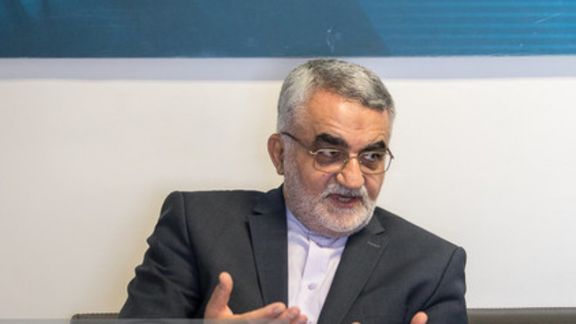
A senior Iranian lawmaker called for strengthening ties with China, Russia, and neighboring countries after Supreme Leader Ali Khamenei rejected the idea of negotiations with the United States.
“We pursue and advance our national issues and interests independently of the United States,” said Alaeddin Boroujerdi, a member of the National Security and Foreign Policy Committee.
“Therefore, it is essential to strengthen our relations with major countries like China and Russia, as well as with our neighboring countries,” Boroujerdi told ISNA news agency.
Khamenei said on Friday that talks with Washington are "neither wise, intelligent nor honorable."
He also said that US withdrawal from the 2015 nuclear deal under President Donald Trump shows Washington is unreliable.
“The Islamic Republic trusted America once, despite the Supreme Leader’s clear distrust. The Americans, however, failed to honor their commitments, even tearing up an agreement backed by a UN resolution,” Boroujerdi added.
He also said Iran’s policies must reflect reciprocity, warning that threats to Iranian national security would be met with countermeasures.
The remarks indicate that hardliners are coalescing around the intransigent take of the Supreme Leader on talks, in opposition to the public desire for talks mooted by the relatively moderate government.
While Iran’s leadership frames its anti-US approach as protecting national sovereignty, the economic toll of sanctions and isolation has taken a heavy toll.
Ordinary Iranians are confronted with worsening standards of living as the US dollar is being exchanged at over 890,000 rials on Saturday, a new record low. Inflation, unemployment, and shortages in critical sectors continue to strain daily life.
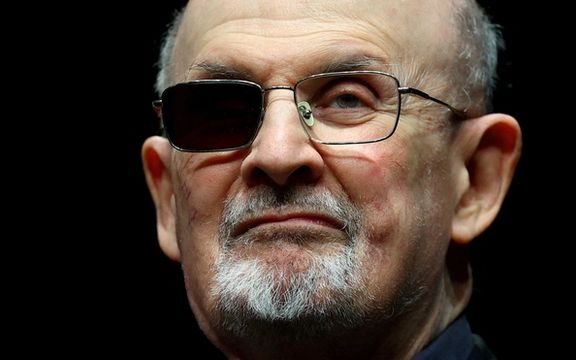
The trial began on Monday of a man accused of stabbing Salman Rushdie, the irreverent author menaced with a religious death warrant from Islamic Republic founder Ayatollah Ruhollah Khomeini.
Hadi Matar, a 27-year-old American whose parents are of Lebanese Shi'ite extraction, pleaded not guilty to second-degree attempted murder and assault.
Jurors in the Mayville, New York courtroom have heard the prosecutor's opening statements on how the knife attack at a 2022 New York lecture unfolded in a matter of seconds, leaving Rushdie blinded in one eye and fighting for his life in hospital.
Moments before 77-year-old Rushdie was stabbed on stage, a poet was introducing the book event on the topic of keeping writers safe from harm, Chautauqua District Attorney Jason Schmidt told the jury according to Reuters.
The defendant is accused of running on stage and stabbing Rushdie up to 10 times. The attack also damaged Rushdie’s liver and paralyzed one hand.
Matar’s defense team has questioned the neutrality of police officers’ testimony.
Lynn Schaffer, an assistant public defender here in Chautauqua County, opened her remarks by saying it was an honor to defend Matar and argued that the case and sequence of events is not straightforward, a BBC journalist attending the trial said.
Matar’s lead defense lawyer, Nathaniel Barone, was absent due to illness.
Who is Hadi Matar?
In July 2024, two years after the incident, an unsealed indictment charged the defendant with providing material support to Iran-backed Hezbollah, sometime between September 2022 and August 2022.
The indictment did not specify how Matar is linked to the group.
In an interview with the Daily Mail, Matar's mother told the outlet that her son went on a month-long trip to the Middle East in 2018 and came back radicalized.
Rushdie was forced to spend about 10 years in hiding throughout the United Kingdom and United States for much of the 90s after Khomeini issued a fatwa or religious edict to kill the author.
Khomeini called on “the proud Muslim people of the world” to kill the author of “The Satanic Verses,” which centered on the life of the Prophet Mohammad.
The trial is expected to last up to 10 days, the Associated Press reported.
Rushdie who released a memoir after the attacked called Knife, is expected to take the stand and come face-to-face with his would-be murderer later in the trial.
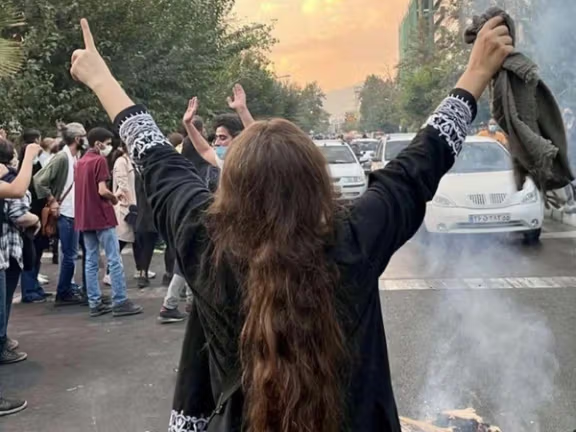
A young Iranian woman was arrested for appearing without a mandatory head covering and chanting "death to the dictator" in a public square in southwestern Iran on Monday, an eyewitness told Iran International.
The protest points to smoldering discontent even after authorities quashed by force a nationwide protest movement against clerical rule which began in 2022.
At the central clocktower square in the city of Yasuj, a young woman who appeared to be in her late 20s removed her headscarf and outer layer of clothes in the midst of a crowd according to the eyewitness, who declined to be identified for security reasons.
Dressed in a tank top and trousers, she chanted “Death to the dictator!” the source added. The slogan is a common refrain among dissidents against 85-year-old Supreme Leader and theocrat Ali Khamenei.
Iran International later obtained a video showing the woman chanting "Long Live the King".
Security forces promptly descended on the woman, wrapping her in a blanket and forcibly bundling her into a departing car.
A source, speaking to Iran International on condition of anonymity for security reasons, said two men were also arrested after attempting to defend her during the arrest.
The Woman, Life, Freedom movement in Iran was sparked by the death of a young woman, Mahsa Amini, in September 2022 while in police custody over hijab violations.
Hardliners have intensified efforts to enforce strict dress codes for women even as a new law on hijab enforcement appears to have lapsed and Javad Zarif, a relative moderate Iranian vice president, said the government aimed not to pressure women.
Despite the official statements and widespread public defiance, government measures to reinforce mandatory hijab laws have persisted, resulting in the closure of businesses and the impoundment of vehicles associated with hijab offenses.